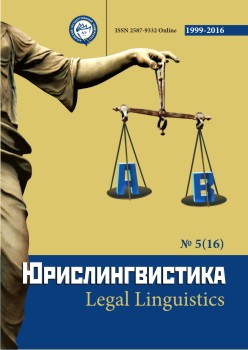Corrective interpretation of certain provisions of the criminal procedure law as a means of clarifying their exact meaning and correct application
Abstract
The article describes the problem associated with the legislative process in the field of criminal procedural legislation. There are numerous blunders and inconsistencies that the legislator admits in the text of the Code of Criminal Procedure of the Russian Federation due to non-compliance with the requirements of legal techniques. Realizing that the legislator will never be immune from mistakes in accepting, changing and abolishing the norms of the criminal procedural legislation, the science of the criminal procedure has developed and offered the law enforcement agent a means of resolving the emerging problem situation when applying such norms in the form of corrective interpretation. With the help of this kind of interpretation, such subjects of the criminal process as the inquirer, investigator, prosecutor and the court will be able to correctly understand the meaning of the erroneous provisions of the criminal procedure code of the Russian Federation, which the legislator laid in them. The use of corrective interpretation will allow these entities to correct the mistakes made by the legislator in the text of criminal procedural legislation of a technical, semantic and logical nature, which will lead to the correct application of its current provisions.
Downloads
Metrics
References
Победкин А.В. Качество уголовно-процессуального закона и компетентность законодателя // Вестник ВГУ. Серия: Право. 2012. № 1. С. 393-402.
Александров А.С. О методологических следствиях, вызываемых терминологическими причинами (из опыта прочтения текста УПК РФ) // Правоведение. 2005. № 5. С. 6-18.
Калиновский К.Б. Презумпция добросовестности законодателя - опровержима? Коррекционное толкование отдельных положений законов о внесении изменений и дополнений в УПК РФ // Журнал российского права. 2008. № 8. С. 91-97.
Петухов Е.Н. Технико-коррекционное толкование отдельных норм уголовно-процессуального законодательства // Актуальные проблемы борьбы с преступлениями и иными правонарушениями: материалы пятнадцатой международной научно-практической конференции / под ред. Ю.В. Анохина. – Барнаул: Барнаульский юридический институт МВД России, 2017. Ч.1. С. 137-139.
LITERATURE
Pobedkin A.V. The quality of the criminal procedural law and the competence of the legislator [Kachestvo ugolovno-protsessual'nogo zakona i kompetentnost' zakonodatelja] // Vestnik VSU. Series: Right. 2012. № 1. P. 393-402.
Alexandrov A.S. On the methodological consequences caused by terminological reasons (from the experience of reading the text of the Code of Criminal Procedure) [O metodologicheskih sledstvijah, vyzyvaemyh terminologicheskimi prichinami (iz opyta prochtenija teksta UPK RF)]// Jurisprudence. 2005. № 5. With. 6-18.
Kalinovsky K.B. Presumption of good faith legislator - refute? Corrective interpretation of certain provisions of the laws on the introduction of changes and additions to the Code of Criminal Procedure [Prezumptsija dobrosovestnosti zakonodatelja - oproverzhima? Korrektsionnoe tolkovanie otdel'nyh polozhenij zakonov o vnesenii izmenenij i dopolnenij v UPK RF] / / Journal of Russian Law. 2008. № 8. P. 91-97.
Petukhov E.N. Technical and Corrective Interpretation of Certain Norms of Criminal Procedural Law [Tehniko-korrektsionnoe tolkovanie otdel'nyh norm ugolovno-protsessual'nogo zakonodatel'stva] // Actual Problems of Combating Crimes and Other Offenses: Proceedings of the Fifteenth International Scientific and Practical Conference / Ed. Yu.V. Anokhin. - Barnaul: Barnaul Law Institute of the Ministry of Internal Affairs of Russia, 2017. Part 1. Pp. 137-139.
Copyright (c) 2017 Юрислингвистика

This work is licensed under a Creative Commons Attribution 4.0 International License.
The authors, which are published in this journal, agree to the following conditions:
1. Authors retain the copyright to the work and transfer to the journal the right of the first publication along with the work, at the same time licensing it under the terms of the Creative Commons Attribution License, which allows others to distribute this work with the obligatory indication of the authorship of this work and a link to the original publication in this journal .
2. The authors retain the right to enter into separate, additional contractual agreements for the non-exclusive distribution of the version of the work published by this journal (for example, to place it in the university depository or to publish it in a book), with reference to the original publication in this journal.
3. Authors are allowed to post their work on the Internet (for example, in a university repository or on their personal website) before and during the review process of this journal, as this may lead to a productive discussion, as well as more links to this published work (See The Effect of Open Access).











